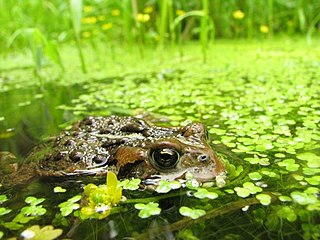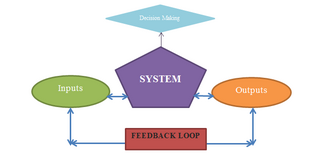
Ecology is the study of the relationships among living organisms, including humans, and their physical environment. Ecology considers organisms at the individual, population, community, ecosystem, and biosphere level. Ecology overlaps with the closely related sciences of biogeography, evolutionary biology, genetics, ethology, and natural history.

An ecosystem consists of all the organisms and the physical environment with which they interact. These biotic and abiotic components are linked together through nutrient cycles and energy flows. Energy enters the system through photosynthesis and is incorporated into plant tissue. By feeding on plants and on one another, animals play an important role in the movement of matter and energy through the system. They also influence the quantity of plant and microbial biomass present. By breaking down dead organic matter, decomposers release carbon back to the atmosphere and facilitate nutrient cycling by converting nutrients stored in dead biomass back to a form that can be readily used by plants and microbes.

Theoretical ecology is the scientific discipline devoted to the study of ecological systems using theoretical methods such as simple conceptual models, mathematical models, computational simulations, and advanced data analysis. Effective models improve understanding of the natural world by revealing how the dynamics of species populations are often based on fundamental biological conditions and processes. Further, the field aims to unify a diverse range of empirical observations by assuming that common, mechanistic processes generate observable phenomena across species and ecological environments. Based on biologically realistic assumptions, theoretical ecologists are able to uncover novel, non-intuitive insights about natural processes. Theoretical results are often verified by empirical and observational studies, revealing the power of theoretical methods in both predicting and understanding the noisy, diverse biological world.

Natural capital is the world's stock of natural resources, which includes geology, soils, air, water and all living organisms. Some natural capital assets provide people with free goods and services, often called ecosystem services. All of these underpin our economy and society, and thus make human life possible.
The carrying capacity of an environment is the maximum population size of a biological species that can be sustained by that specific environment, given the food, habitat, water, and other resources available. The carrying capacity is defined as the environment's maximal load, which in population ecology corresponds to the population equilibrium, when the number of deaths in a population equals the number of births. The effect of carrying capacity on population dynamics is modelled with a logistic function. Carrying capacity is applied to the maximum population an environment can support in ecology, agriculture and fisheries. The term carrying capacity has been applied to a few different processes in the past before finally being applied to population limits in the 1950s. The notion of carrying capacity for humans is covered by the notion of sustainable population.

Human ecology is an interdisciplinary and transdisciplinary study of the relationship between humans and their natural, social, and built environments. The philosophy and study of human ecology has a diffuse history with advancements in ecology, geography, sociology, psychology, anthropology, zoology, epidemiology, public health, and home economics, among others.

Ecological economics, bioeconomics, ecolonomy, eco-economics, or ecol-econ is both a transdisciplinary and an interdisciplinary field of academic research addressing the interdependence and coevolution of human economies and natural ecosystems, both intertemporally and spatially. By treating the economy as a subsystem of Earth's larger ecosystem, and by emphasizing the preservation of natural capital, the field of ecological economics is differentiated from environmental economics, which is the mainstream economic analysis of the environment. One survey of German economists found that ecological and environmental economics are different schools of economic thought, with ecological economists emphasizing strong sustainability and rejecting the proposition that physical (human-made) capital can substitute for natural capital.
Agroecology is an academic discipline that studies ecological processes applied to agricultural production systems. Bringing ecological principles to bear can suggest new management approaches in agroecosystems. The term can refer to a science, a movement, or an agricultural practice. Agroecologists study a variety of agroecosystems. The field of agroecology is not associated with any one particular method of farming, whether it be organic, regenerative, integrated, or industrial, intensive or extensive, although some use the name specifically for alternative agriculture.
Cultural ecology is the study of human adaptations to social and physical environments. Human adaptation refers to both biological and cultural processes that enable a population to survive and reproduce within a given or changing environment. This may be carried out diachronically, or synchronically. The central argument is that the natural environment, in small scale or subsistence societies dependent in part upon it, is a major contributor to social organization and other human institutions. In the academic realm, when combined with study of political economy, the study of economies as polities, it becomes political ecology, another academic subfield. It also helps interrogate historical events like the Easter Island Syndrome.

Ecological engineering uses ecology and engineering to predict, design, construct or restore, and manage ecosystems that integrate "human society with its natural environment for the benefit of both".
Ecological anthropology is a sub-field of anthropology and is defined as the "study of cultural adaptations to environments". The sub-field is also defined as, "the study of relationships between a population of humans and their biophysical environment". The focus of its research concerns "how cultural beliefs and practices helped human populations adapt to their environments, and how people used elements of their culture to maintain their ecosystems". Ecological anthropology developed from the approach of cultural ecology, and it provided a conceptual framework more suitable for scientific inquiry than the cultural ecology approach. Research pursued under this approach aims to study a wide range of human responses to environmental problems.

Systems ecology is an interdisciplinary field of ecology, a subset of Earth system science, that takes a holistic approach to the study of ecological systems, especially ecosystems. Systems ecology can be seen as an application of general systems theory to ecology. Central to the systems ecology approach is the idea that an ecosystem is a complex system exhibiting emergent properties. Systems ecology focuses on interactions and transactions within and between biological and ecological systems, and is especially concerned with the way the functioning of ecosystems can be influenced by human interventions. It uses and extends concepts from thermodynamics and develops other macroscopic descriptions of complex systems.

The environmental humanities is an interdisciplinary area of research, drawing on the many environmental sub-disciplines that have emerged in the humanities over the past several decades, in particular environmental literature, environmental philosophy, environmental history, science and technology studies, environmental anthropology, and environmental communication. Environmental humanities employs humanistic questions about meaning, culture, values, ethics, and responsibilities to address pressing environmental problems. The environmental humanities aim to help bridge traditional divides between the sciences and the humanities, as well as between Western, Eastern, and Indigenous ways of relating to the natural world and the place of humans within it. The field also resists the traditional divide between "nature" and "culture," showing how many "environmental" issues have always been entangled in human questions of justice, labor, and politics. Environmental humanities is also a way of synthesizing methods from different fields to create new ways of thinking through environmental problems.

Health ecology is an emerging field that studies the impact of ecosystems on human health. It examines alterations in the biological, physical, social, and economic environments to understand how these changes affect mental and physical human health. Health ecology focuses on a transdisciplinary approach to understanding all the factors which influence an individual's physiological, social, and emotional well-being.
The following outline is provided as an overview of and topical guide to ecology:
Ecological systems theory is a broad term used to capture the theoretical contributions of developmental psychologist Urie Bronfenbrenner. Bronfenbrenner developed the foundations of the theory throughout his career, published a major statement of the theory in American Psychologist, articulated it in a series of propositions and hypotheses in his most cited book, The Ecology of Human Development and further developing it in The Bioecological Model of Human Development and later writings. A primary contribution of ecological systems theory was to systemically examine contextual variability in development processes. As the theory evolved, it placed increasing emphasis on the role of the developing person as an active agent in development and on understanding developmental process rather than "social addresses" as explanatory mechanisms.
Socio-ecological models were developed to further the understanding of the dynamic interrelations among various personal and environmental factors. Socioecological models were introduced to urban studies by sociologists associated with the Chicago School after the First World War as a reaction to the narrow scope of most research conducted by developmental psychologists. These models bridge the gap between behavioral theories that focus on small settings and anthropological theories.
James J. Kay was an ecological scientist and policy-maker. He was a respected physicist best known for his theoretical work on complexity and thermodynamics.

Regenerative design is an approach to designing systems or solutions that aims to work with or mimic natural ecosystem processes for returning energy from less usable to more usable forms. Regenerative design uses whole systems thinking to create resilient and equitable systems that integrate the needs of society with the integrity of nature. Regenerative design is an active topic of discussion in engineering, landscape design, food systems, and community development.
A social-ecological system consists of 'a bio-geo-physical' unit and its associated social actors and institutions. Social-ecological systems are complex and adaptive and delimited by spatial or functional boundaries surrounding particular ecosystems and their context problems.











